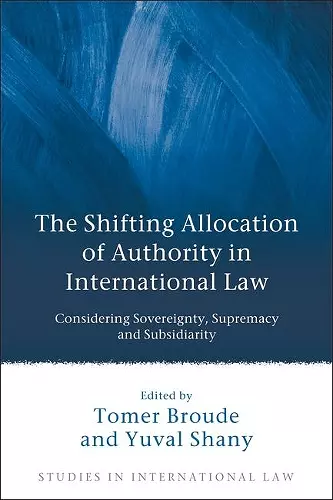The Shifting Allocation of Authority in International Law
Considering Sovereignty, Supremacy and Subsidiarity
Tomer Broude editor Professor Yuval Shany editor
Format:Hardback
Publisher:Bloomsbury Publishing PLC
Published:13th Jun '08
Currently unavailable, and unfortunately no date known when it will be back

International law is fragmented and complex, and at the same time increasingly capable of shaping reality in areas as diverse as human rights, trade and investment, and environmental law. The increased influences of international law and its growing institutionalization and judicialization invites reconsideration of the question how should the authority to make and interpret international law be allocated among states, international organizations and tribunals, or in other words, "who should decide what" in a system that formally lacks a central authority? This is not only a juridical question, but one that lies at the very heart of the political legitimacy of international law as a system of governance, defining the relationship between those who create the law and those who are governed by it in a globalizing world. In this book, leading international legal scholars address a broad range of theoretical and practical aspects of the question of allocation of authority in international law and debate the feasibility of three alternative paradigms for international organization: Sovereignty, Supremacy and Subsidiarity. The various contributions transcend technical solutions to what is in essence a problem of international constitutional dimensions. They deal, inter alia, with the structure of the international legal system and the tenacity of sovereignty as one of its foundations, assess the role of supremacy in inter-judicial relations, and draw lessons from the experience of the European Union in applying the principle of subsidiarity. This volume will be of great interest to scholars and practitioners of international law alike.
The 15 contributors offer theoretical, analytical and practical responses to the attempt by international law-makers and institutions to exert their authority vis-a-vis states, while addressing, at the same time, challenges to their legitimacy from other state norms...The editors have done a fine job of amassing a wide repertoire of scholars, from a wide repertoire of backgrounds, to discuss a wide repertoire of topics...of huge significance to the informed reader. Lee P. Ruddin The Law & Politics Book Review Vol.18, No.12, 29th December 2008 This book represents a thought-provoking attempt to examine the tensions between the traditional concept of sovereignty and the modern allocation of decision-making authority to international organisations, courts and other international actors... This work needs to be recommended to whoever is interested in the development of the legal mechanisms behind international authority and decision-making in the 21st century. Freya Baetens The Cambridge Law Journal March 2009 The variety of authors and topics in The Shifting Allocation of Authority in International Law works to show, on the one hand, a very broad general approach to the issue of power allocation in the international community today and, on the other hand, a more detailed and in-depth analysis of specific issues. The mix of theoretical analyses and practical solution-offerings might be disconcerting to some but their complementarity definitely deepens the value of the study. Myriam Alvarez-Peveyre International & Comparative Law Quarterly Volume 58 April 2009 Le lecteur trouvera dans ce livre de tres riches pistes de reflexion relatives au concept d'autorite en droit international. L.D. Annuaire Francais de Droit International October 2009
ISBN: 9781841137971
Dimensions: 234mm x 156mm x 33mm
Weight: unknown
429 pages